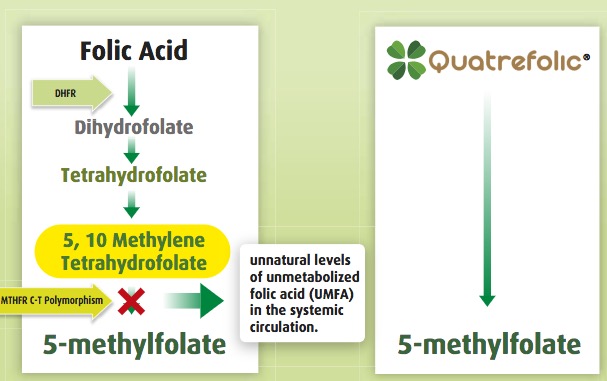In the past few decades, numerous studies have shown a high incidence of folate deficiency correlated with mental symptoms, especially depression and cognitive decline in epileptic, neurological, psychiatric, geriatric and psychogeriatric populations.
Recent studies in elderly people suggest a link between folate, homocysteine, ageing, depression, and dementia, including Alzheimer's disease and vascular disease.
One reason for the apparently high incidence of folate deficiency in elderly people is that folate concentrations in serum and cerebrospinal fluid fall and plasma homocysteine rises with age, perhaps contributing to the ageing process.
In 2000, Bottiglieri et al. suggested that depressed individuals with folate deficiency and hyperhomocysteinemia might be more prone to have impairments in brain methylation reactions and neurotransmitters metabolism.

In depressed elderly people, supplementation of 5-methyltetrahydrofolate, such as Quatrefolic, is suggested to guarantee the right dosage of biologically active folate and to efficiently support methylation, neurotransmitters production, and nervous system function.
Quatrefolic is the glucosamine salt of biologically active folate 5-methylfolate or methyltetrahydrofolate that can reach the systemic circulation and cross the blood-brain barrier straight to the brain cells.
The allows it to be used directly in the folate cycle. Synthetic folic acid and dietary folate cannot cross the blood- brain barrier.
Quatrefolic provides the naturally occurring 5-methyltetrahydrofolate(5-MTHF):
- the well absorbed folate even when gastrointestinal pH is altered
- the only species normally found in the circulation
- the folate that is normally transported into peripheral tissues to be used for cellular metabolism
- the only form able to cross the BBB (Blood Brain Barrier)
Quatrefolic bioavailability is not affected by multi-steps process of conversion and by metabolic defects typical of folic acid and food folate, such as the polymorphism of the enyme MTHFR (methyltetrahydrofolate reductase).
In fact, some individuals, due to their unique genetic patterns and expression, have a polymorphic form of this enzyme and do not produce adequate or effective form of it, with impaired folate metabolism and with exacerbation of folate deficiency. These genetic alterations are already involved in the increase of homocysteine blood level.




